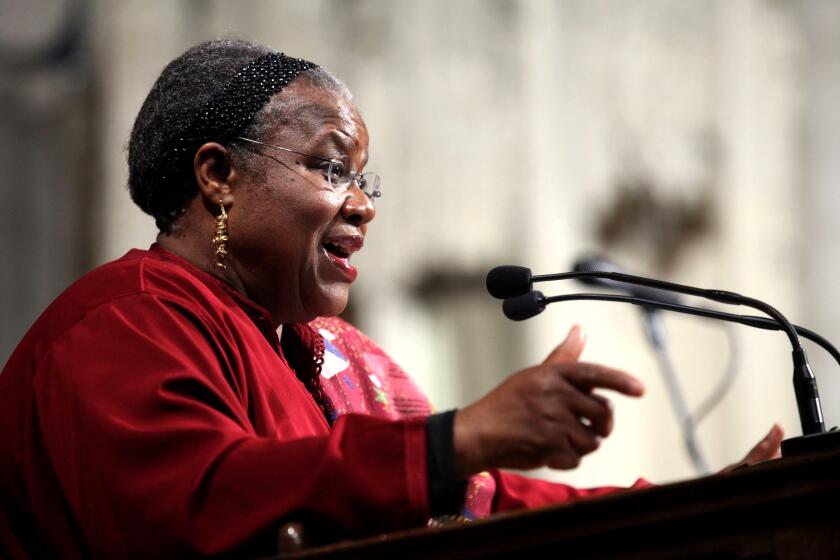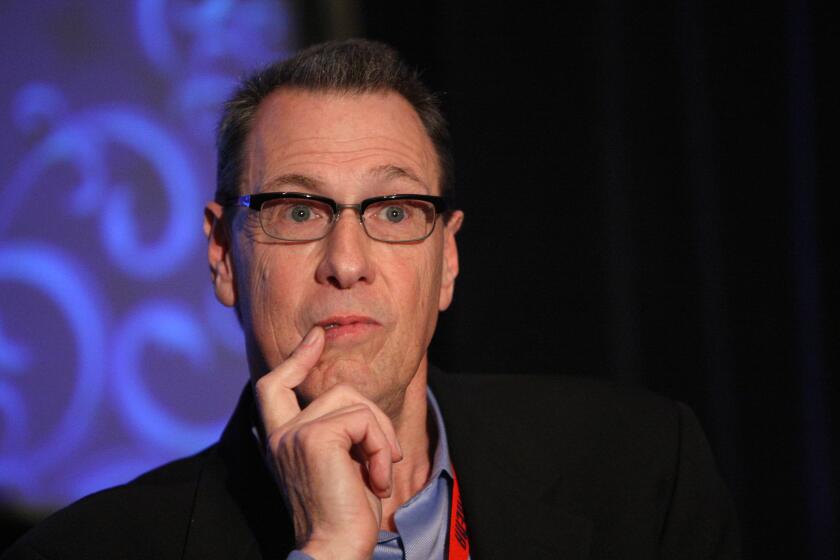Juicing Up Pulp : After spending 15 years in relative obscurity, the English band and its lead man, Jarvis Cocker, have seen their persistence pay off sweetly.
At this midpoint of the ‘90s, British pop has found its most improbable heroes in the shape of a group of self-proclaimed misfits called Pulp.
By the end of an astonishingly successful 1995, the sextet from Sheffield, England, was routinely mentioned after Oasis and Blur as the third major force in Britpop, and the skinny, bespectacled figure of frontman Jarvis Cocker has been seen on countless magazine covers.
When Pulp’s album “Different Class” was released in England in November, its chart debut at No. 1 was a foregone conclusion. First-week sales: 302,000 copies.
It was a phenomenal achievement by any standard. For a band that had been around for 15 years, almost all of it spent in obscurity, it was little short of miraculous. Cocker himself became a national alternative icon and sex symbol--despite being in his 30s and hardly classically handsome. For once, wit, audacity and great tunes triumphed over more obviously marketable virtues.
What’s more, nobody could say that Pulp succeeded by playing it safe. Cocker’s dryly witty lyrics--dealing explicitly with class conflict (“Common People”) and with the pros and cons of illegal drugs (“Sorted for E’s and Wizz”)--trampled on taboos with reckless abandon.
So it’s hardly a surprise to find Cocker breaking the rules of record promotion just as boldly when asked in an interview about the American release Feb. 27 of “Different Class” (see review, Page 67).
“God knows what’ll happen to it,” the singer, 32, remarks casually.
“That’s not intended as any kind of a slight on Americans, but from what I can perceive about American music, it’s quite bold and definite in its statements. It deals in black-and-white issues. What I like to write about is ambiguity, so I wonder if they’ll be bothered about it.”
The prevailing themes of Pulp songs seem to be the unromantic, awkward realities of sex, and life without the benefit of financial security. Aren’t these things likely to be understood anywhere?
“Well, I would hope so,” Cocker replies thoughtfully. “I think that the things that motivate people wherever they live in the world are the same, so if you can describe it well enough, it’s just the scenery that’s different.”
So will Pulp--which toured America as Blur’s opening act in 1994--be returning to America?
“We’ll go there if we’re wanted, if it seems that there’s some action to do with the album, but I don’t really see the point in forcing ourselves down people’s throats. I’m not as young as I used to be. I can’t take these rigors of touring.”
Hasn’t he been doing rather a lot of it lately, all over Europe?
“That’s it! That’s how I know I can’t take it!”
Of course, it’s one of the corniest of pop interview cliches for artists to claim that they make music primarily for their own pleasure and that any commercial success is or will be a welcome but nonessential bonus.
What’s different in Pulp’s case is that its history makes it possible to believe Cocker when he expresses those sentiments. After all, he kept the faith through all those barren years during which he often had to survive on welfare payments.
The band formed in 1981 in a Sheffield post-punk scene that also produced Human League and ABC. But while those other bands had international success, Pulp remained largely a local favorite, with a reputation for strong concerts. After a decade of critically hailed independent records, the band signed with Island Records, gaining a solid British reception for the 1994 album “His ‘n’ Hers” (the band’s U.S. debut) before hitting the jackpot with “Different Class.”
The survival, Cocker says, is simply a matter of persistence and perspective.
“Most groups split up after they’ve been together 15 years,” says Cocker, who is the only surviving member of the original lineup. “The thing is we never got enough exposure to feel [the public] had turned its nose up. I left Sheffield in 1988 to go to London and do a film course. . . . People did other things in the meantime. It wasn’t that we sat in a room for 10 years saying, ‘Why aren’t we famous?’ ”
More recently, Pulp’s tour with Blur, at the height of the latter’s much hyped battle with Oasis for the title of kings of Britpop, gave Cocker a great perspective on the destructiveness of such hyper-competitive attitudes.
“Oasis have won that particular battle, and now Blur feel like they’re a failure--or at least, I think [singer] Damon [Albarn] thinks they’re a failure. That’s a daft attitude.”
Cocker is, however, honest enough to acknowledge that the last two years have changed him. The man who built his success on telling tales of everyday life among the have-nots has now conspicuously left that environment behind.
“Obviously,” he reflects, “you’ve got to be true to what you are. I think this is why Morrissey had loads of problems, and why he’s not considered to be very significant anymore. He just kept harping on about the same things, and after a while people think, ‘Well, it’s all right going on about being inadequate, but you’re not inadequate anymore, because you’re popular.’ ”
Cocker is already contemplating life beyond the pop world. Having studied cinema at college--and dabbled in film directing via the short feature film that accompanied Pulp’s single “Do You Remember the First Time?”--Cocker can contemplate a possible future in another artistic medium.
“When I retire from music, as I undoubtedly must one day, I hope to concentrate on filmmaking. I think it’s a more dignified thing to do in your old age than to keep parading around on a stage.”
For now, though, his enthusiasm for music remains undimmed--even boosted by the “overnight” success.
“I have got more confidence in myself. After a long time . . . I feel that I’ve been passed fit for human consumption.”
More to Read
The biggest entertainment stories
Get our big stories about Hollywood, film, television, music, arts, culture and more right in your inbox as soon as they publish.
You may occasionally receive promotional content from the Los Angeles Times.






